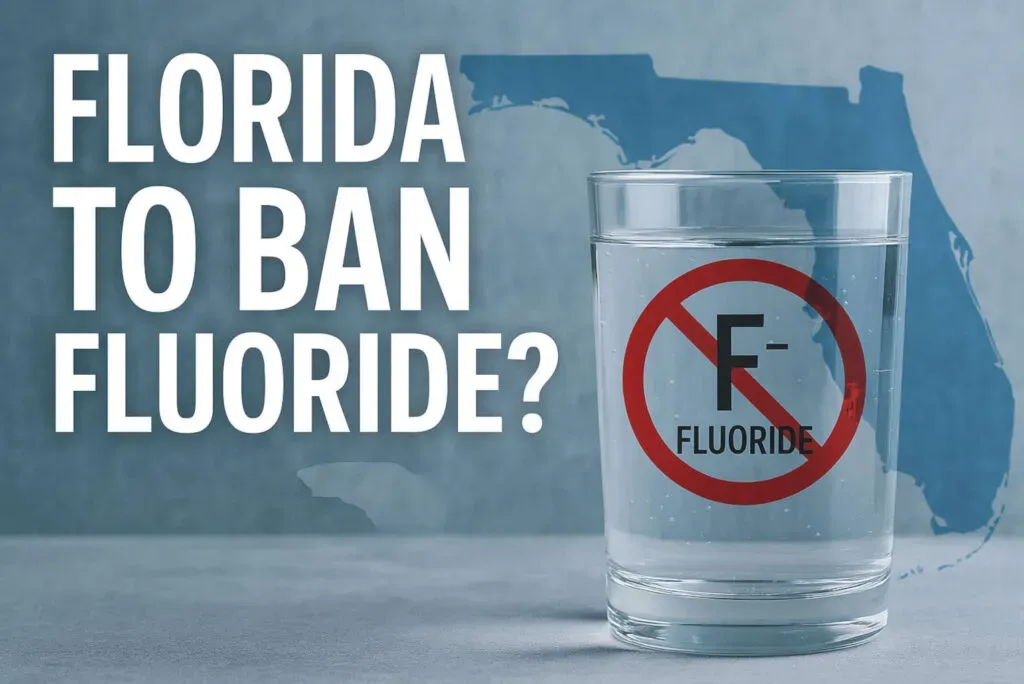The recent Florida fluoride ban has sparked significant discussion across the state, as Governor Ron DeSantis officially signed legislation prohibiting the addition of fluoride to public drinking water supplies. This pivotal move marks a shift in the state’s approach to fluoride legislation Florida, stripping local governments of their authority to add this medical substance. Advocates for medical freedom in Florida have lauded the new law, emphasizing the importance of informed consent regarding health decisions. As public health debates intensify, concerns arise around the implications of fluoride consent laws and the ramifications for community health. While some fear the loss of fluoride could lead to increased dental issues, others view this decision as a step toward personal choice and autonomy over one’s health in the Sunshine State.
In a bold legislative action, Florida has now restricted the use of fluoride in its municipal water systems, leading to widespread implications for public health policy. This ban aligns with a growing movement that emphasizes the right for individuals to choose what enters their bodies, reflecting broader sentiments around health autonomy. The focus of recent debates has shifted toward whether the government should have the authority to medicate populations without explicit consent. As concerns rise over the safety and necessity of additives in drinking water, particularly fluoride, public discourse will likely continue to evolve. Supporters of the ban argue that it empowers residents to take control of their own health decisions, illustrating a key tenet of the medical freedom Florida advocates cherish.
Understanding the Florida Fluoride Ban
On Tuesday, Florida Governor Ron DeSantis signed a landmark legislation into law that effectively bans the addition of fluoride to public drinking water across the state. This decision primarily strips local governments of their authority to add fluoride or other medical substances to the water supply, marking a significant shift in public health policy. Supporters of the ban argue that it aligns with the principles of medical freedom and informed consent, emphasizing that individuals should have the autonomy to choose what goes into their bodies. The law, known as SB 700, symbolizes a broader trend towards skepticism regarding governmental health mandates and the push for clearer health transparency.
DeSantis highlighted that many Floridians may not be aware that adding fluoride to water can be perceived as forced medication. During his announcement, he reinforced the notion that people deserve to make informed choices about their health and wellness. The legislation has received backing from various advocacy groups that prioritize consumer health rights, positioning it as a crucial step towards enhancing personal freedom in health-related decisions. With this move, Florida joins a growing movement aimed at re-evaluating the balance between public health initiatives and individual liberties.
The Implications of Medical Freedom in Florida
The new fluoride legislation parallels a rising emphasis on medical freedom in Florida, reflecting a wider public unrest about state mandates on health interventions. Proponents, including state officials and local advocates, claim that the law presents a vital shift toward prioritizing consumer choice over government regulations in health matters. By ensuring that Florida’s drinking water remains free from mandated additives, the law resonates with constituents who are increasingly wary of centralized medical policies—especially given recent controversies surrounding health measures implemented during the COVID-19 pandemic.
Along with the supporters of the fluoride ban, many activists are advocating for similar legislation across the country, voicing that the right to opt-out of such medical interventions is a fundamental aspect of personal freedoms. This shift has spurred public health debates as they navigate the challenges of maintaining community health standards while respecting individual choices. The introduction of this law may pave the way for further discussions regarding various health policies and their implications for individual rights.
Local Governments’ Role in Public Health
With the passing of SB 700, the role of local governments in public health comes under scrutiny as their ability to control water fluoridation is curtailed. This represents a critical juncture in the ongoing debate about local versus state authority in public health matters. Advocates for the ban believe that residents should have more control over their health choices, while critics argue that local governments should retain the ability to address public health issues as they see fit, especially in combating dental decay in vulnerable populations.
Critics of the ban assert that fluoridation has been a successful public health strategy targeting dental health, particularly among children who may not have access to regular dental care. They argue that without the ability to add fluoride to public drinking water, the state may see a rise in dental health issues. This clash between government oversight and community health autonomy continues to fuel discussions on the effective measures cities and counties can take to protect public health while accommodating individual rights.
Public Response to Fluoride Legislation
Public reactions to the Florida fluoride ban have been deeply divided. Supporters, including DeSantis, argue that citizens should not be subjected to medicative supplements without consent. They believe that this ban fosters a culture of informed decision-making, allowing Floridians greater freedom regarding their health. This discussion reveals a significant movement towards trust in individuals’ capacity to make health decisions, resonating with many in the community who feel overregulated by previous health initiatives.
On the other hand, health professionals and dental associations have expressed concerns about possible repercussions of abolishing fluoride in public water supplies. They warn that such a ban could lead to detrimental dental health outcomes among children and lower-income families who may lack access to fluoridated alternatives. The legislative change undoubtedly has sparked broader public health discussions about the implications of individual choice versus collective well-being.
Exploring the Impact on Public Health Debates
The Florida fluoride ban has reignited public health debates on whether health policies should prioritize individual rights over collective health benefits. Many proponents argue that mandatory fluoridation infringes on personal liberties and undermines consumer choice. This sentiment aligns with a larger national movement advocating for reduced government interference in personal health decisions, reflecting a cultural shift in how health interventions are approached by policymakers.
As discussions unfold surrounding public health policies, highlighting informed consent will be critical in shaping future legislative actions. Advocates for medical freedom assert that community-wide health strategies must incorporate respect for individual choices. As such, the legal frameworks governing health interventions may need to adapt to reflect the evolving perspectives of Florida residents regarding autonomy and health responsibilities.
The Context of Fluoride in Drinking Water
Fluoride has been a contentious topic in public health for decades, with supporters lauding its effectiveness in reducing tooth decay and critics raising concerns about potential health risks. The newly enacted law in Florida underscores the growing skepticism about fluoride’s use in public health policies, marking a decisive turn away from previously common practices in dental care. Floridians are now being encouraged to take personal responsibility for their dental health, potentially resulting in varied outcomes depending on individual choices.
This legislation could lead to a wider discourse about fluoride’s role in drinking water, as communities assess the implications of adding or omitting fluoride from their water supplies. As resources for dental care become more varied across the state, the differential access to fluoridated water may spark an increase in public health disparities. Thus, it remains essential to explore both the current health challenges and opportunities that emerge as Florida navigates this new legislative landscape.
Navigating Legalities of Public Health Policies
The passage of the Florida fluoride ban underscores significant legal implications regarding public health policies. This ban effectively curtails local governments from inserting fluoride supplements in public drinking water, which raises questions about the authority versus autonomy within state regulations. As more Floridians advocate for medical freedom and the right to informed consent, legal challenges may arise as individuals seek to contest government-imposed health measures.
Furthermore, this legal framework could influence future health policies in Florida by setting a precedent for similar legislation throughout the United States. Observers closely monitor how the impacts of this ban unfold over time, particularly in relation to local health initiatives aimed at combatting issues like tooth decay. The future landscape of health legislation may witness a demand for more community-centered approaches that respect individual choices while seeking to uphold public health standards.
Potential Alternatives to Fluoridation
As Florida moves forward with its ban on fluoride in public drinking water, discussions are likely to focus on potential alternatives to fluoridation for promoting dental health. Advocates for the ban emphasize the need to explore other avenues that do not compromise individual consent, such as dental education and access to dental care. By emphasizing preventive measures like regular dental visits and proper oral hygiene, community members may find alternative paths to improve oral health without the use of fluoride additives.
Additionally, many families may turn to commercially available fluoridated products, such as toothpaste or mouth rinses, as another strategy to maintain dental health. Encouraging sensible dental care practices can play a crucial role in mitigating the negative impacts of the ban on fluoride in drinking water and promoting overall community wellness. Further studies may be needed to assess the effectiveness of these alternatives in sustaining public health outcomes in Florida.
Ensuring Transparency in Health Policies
The recent legislation banning fluoride in Florida emphasizes the necessity for transparency in public health policies. Governor DeSantis, alongside supporters, has consistently argued that individuals have a right to know what is added to their water and that such decisions should not be orchestrated without public input. This call for transparency resonates with wider concerns about government health mandates and their alignment with the citizens’ preferences.
Consumers are now motivated to engage more actively in public health conversations, ensuring their voices are heard regarding health interventions. This increase in community involvement could foster a more informed populace that can advocate for their health needs effectively. By promoting greater transparency, Florida can take steps to reassure its residents that their health interests are prioritized and respected.
Frequently Asked Questions
What is the Florida fluoride ban and what does it entail?
The Florida fluoride ban, enacted through legislation SB 700 signed by Governor Ron DeSantis, prohibits the addition of fluoride to public drinking water in Florida. This law removes local governments’ authority to mandatorily add fluoride, citing a need for medical freedom and informed consent regarding health interventions.
How does the Florida fluoride legislation impact local governments?
Under the Florida fluoride legislation, local governments can no longer add fluoride or medical additives to their public drinking water supplies. This move is part of a broader initiative advocating for individual choice and medical freedom in public health decisions.
What are the main arguments for and against the Florida fluoride ban?
Supporters of the Florida fluoride ban argue it promotes medical freedom and informed consent, aligning with the belief that individuals should not be forced to ingest medication without their agreement. Conversely, critics claim that fluoride is vital for dental health, particularly for children, and that its removal could increase tooth decay rates.
How does the Florida fluoride ban reflect public health debates?
The Florida fluoride ban has ignited public health debates centered around government mandates and individual rights. Proponents view the ban as a necessary step toward medical freedom and personal choice, while opponents emphasize the established benefits of fluoride in preventing tooth decay and maintaining community health.
Will Floridians still have access to fluoridated water after the ban?
Yes, while the Florida fluoride ban prohibits the addition of fluoride to public drinking water, individuals in Florida can still purchase fluoridated water from private suppliers, preserving access for those who want it.
What does Governor DeSantis say about fluoride and informed consent?
Governor Ron DeSantis has stated that adding fluoride to the water supply amounts to forced medication. He emphasizes the importance of informed consent, suggesting that Floridians should have the right to know and choose what they consume regarding health-related interventions.
How are public reactions to the Florida fluoride ban shaped by recent health policies?
Public reactions to the Florida fluoride ban are influenced by increasing skepticism toward government health mandates, which have been fueled by controversies surrounding policies implemented during the COVID pandemic. Many see this legislation as a response to a growing demand for transparency and choice in health matters.
What was the stance of Florida Agriculture Commissioner Wilton Simpson on the fluoride ban?
Florida Agriculture Commissioner Wilton Simpson supported the fluoride ban, highlighting that the law aims to ensure people are not medicated without their consent. He emphasizes the vision of providing clean and medication-free drinking water in Florida.
| Key Points |
|---|
| Governor Ron DeSantis signed the Florida fluoride ban legislation into law, prohibiting fluoride addition to public drinking water. |
| The law effectively removes local governments’ authority to add fluoride to the public water supply, championing medical freedom. |
| Supporters argue it promotes health transparency and informed consent regarding medical additives. |
| Floridians can still purchase fluoridated water from private suppliers, emphasizing consumer choice. |
| Accompanied by notable state officials, DeSantis highlighted that drinking water should hydrate and not medicate. |
| The legislation aligns with the national ‘Make America Healthy Again’ movement, advocating for less government health intervention. |
| Critics voice concerns about potential public health implications, especially regarding children’s dental health. |
| The law has sparked discussions on the balance between individual freedoms and public health responsibilities. |
Summary
The Florida fluoride ban marks a significant shift in public health policy by prioritizing individual choice over government mandates. Introduced by Governor Ron DeSantis, this legislation removes the authority of localities to add fluoride to public drinking water, reflecting a growing sentiment for medical freedom and health transparency. Through this ban, Florida has taken a bold stance on personal liberties, asserting that all residents should have the right to informed consent regarding their health choices.



